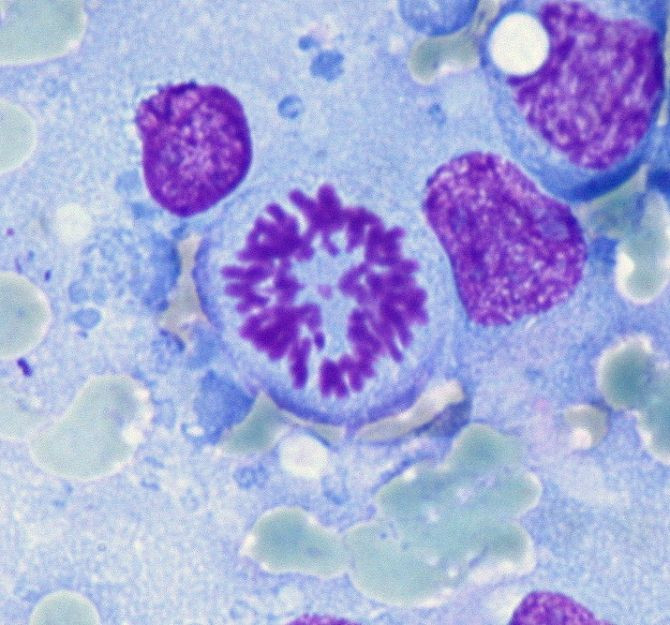Protein Discovery May Aid in New Lymphoma Treatments

New York University Cancer Institute researchers have discovered a new protein that can potentially produce a therapeutic effect for the most common and aggressive type of lymphoma in adults, Diffuse Large B-Cell Lymphoma.
The discovery, published in the journal Nature, was revealed in a study led by Michele Pagano, MD, a professor of oncology and pathology at NYU.
He explains that a therapeutic target is a protein or gene that, when inhibited, possibly by a small molecule or drug, would produce a therapeutic effect, a consequence of a medical treatment.
"We have discovered that the protein FBXO11 is a novel tumor suppressor in B-cells," Pagano said Thursday in a statement announcing the study results.
Most Common Cancer
Diffuse Large B-Cell Lymphoma, or DLBCL, is the most common type of lymphoma. The blood cancer affects the lymphatic system, the body's infection and disease-fighting network.
This type of non-Hodgkin lymphoma develops within B-cells, a type of lymphocytes or white blood cells in the lymphatic tissue of the body.
Mutations of certain genes in the B-cells located in the lymph nodes and other organs of the immune system contribute to the proliferation of DLBCL throughout the body.
Gene’s Inactivity May Lead to Lymphoma
"Our new research findings show deletion or mutation of the FBXO11 gene in B-cells may lead to the formation of Diffuse Large B-Cell Lymphoma," Pagano said.
Pagano told Medical Daily that “FBX011 does not contribute to lymphomagenesis, but its inactivation does,” by increasing the levels of its substrate, “the oncoprotein BCL6.”
In a statement, NYU Langone Medical Center said that the majority of patients with DLBCL overexpress the protein B-Cell Lymphoma 6 (BCL6) by binding to specific DNA sequences.
BCL6 regulates the transcription of genes that are crucial to B-cell development and function. The deregulation of BCL6 leads to the pathogenesis of B-cell lymphomas.
NYU said the finding was proven in experiments in mice expressing BCL6 in B-cells and developing DLBCL similar to the human version of the disease.
The study showed FBX011 as a novel tumor suppressor as it controls BCL6 degradation. NYU said that “FBXO11 functions to keep the levels of BCL6 in B-cells low,” and that the study also showed “BCL6 protein is targeted for degradation by the B-cell's ubiquitin system, the cell-recycling system that helps limit unnecessary cell growth and prevent malignant cell transformation.”
While FBXO11-mediated elimination of BCL6 prevents the development of DLBCL researchers discovered that “FBXO11 is deleted or mutated in many DLBCL cell lines and DLBCL patients.”
“Experimentally, inactivation, mutation or deletion of FBXO11 in B-cells induces overexpression of BCL6,” NYU said.
Gene’s Reconstitution Leads to Death of Tumor Cells
“Moreover, reconstitution of FBXO11 expression in FBXO11-deleted DLBCL cells, by promoting BCL6 degradation, inhibits proliferation and induces the death of tumor cells.”
In other words cells of diffuse large B cell lymphomas are addicted to BCL6 and “in fact, decreasing BCL6 levels in lymphoma cells kills them,” explained Pagano.
"These findings reveal the molecular mechanism behind the overexpression of BCL6 in B-cell lymphomas," Pagano said.
"Mutations and deletions of FBXO11 in B-cells contribute to lymphomagenesis. As lymphoma cells are addicted to BCL6 expression, FBXO11-mediated regulation of BCL6 is a new potential therapeutic strategy for the future treatment of lymphoma."
A Step Closer to New Treatments
Pagano explained to Medical Daily that FBXO11 is able to eliminate BCL6 from cells by inducing its degradation and that the study brings them one step closer to finding new ways of treatment.
“By understanding how BCL6 is regulated by FBXO11 clearly brings us closer to new treatments,” Pagano said.
Pagano explained that they can promote FBXO11-mediated degradation of BCL6 using certain drugs in the 85 percent of patients in which FBXO11 is not inactivated.
“We are currently screening for drugs that do exactly this,” he said.
Pagano serves as the May Ellen and Gerald Jay Ritter Professor of Oncology and Professor of Pathology at NYU Langone Medical Center and is also a Howard Hughes Medical Institute Investigator.
Published by Medicaldaily.com



























